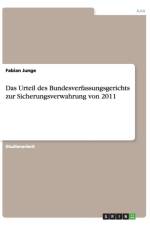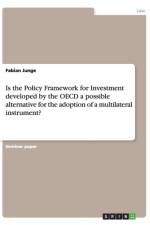von Fabian Junge
17,95 €
Seminar paper from the year 2012 in the subject Law - Civil / Private, Trade, Anti Trust Law, Business Law, grade: 1,3, University of Groningen, language: English, abstract: When examining the development of foreign direct investment and the effects of multinationalcorporations over the last decades, one has to come to the conclusion that the importance increased andgrew significantly. Until the 1970s most of the countries were opposed to foreign direct investment due toa fear of losing economic and political independence by allowing foreign control over their economicresources and their key industries. Since the 1990s, there has been a positive turn towards foreign directinvestment and its liberalization, because it is predominantly seen as requirement for economic growth,productivity increase, creation of export potential and technology transfer. As a result, the amount offoreign direct investment expanded faster than the world economy and the volume of international traderesulting in a need to control the investment flows and to regulate the area.1By virtue of the rather sensitive topic of foreign direct investments, it was impossible in the past for theinternational community to agree upon an uniform and harmonized international regime setting out thestandards for international investments. Hence, a multitude of national and international policy rules andprinciples govern the relevant aspects in this field resulting in a variety of international investmentagreements. As an example, more than 2670 bilateral investment treaties and more than 270 otherinternational investment agreements have been adopted globally until the end of 2008.2Nevertheless, the plurality of the different international investment agreements with their different scopes,different types, different signatories have led to a patchwork of treaties resulting in a highly fragmentedand incoherent international investment regime. As a result of this and the problems accompanying it,such as a more and more complex structure and an increase in investment disputes due to theinterpretation and implementation of these treaties, the desire to adopt a general coherent framework forinvestment has been stirred, especially by international organizations like the WTO or the OECD.The OECD (Organization for Economic Co-operation and Development) is an international economicorganization consisting out of 34 countries and was founded in 1961 to stimulate economic progress andworld trade.













